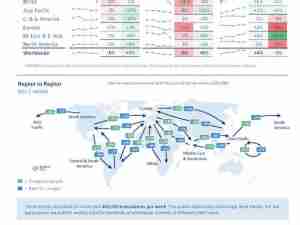Earnings of Deutsche Lufthansa AG jumped in the year its biggest national rival folded.
Operating profit rose 70 percent in 2017 to 2.97 billion euros ($3.7 billion), Lufthansa said on Thursday, as a scarcity of available aircraft following the grounding of Air Berlin pushed up ticket prices, and unit costs fell. The airline also secured some of its former rival’s jets for its own operations. That, coupled with its acquisition of Brussels Airlines, helped Lufthansa’s revenue rise the fastest in seven years.
Earnings growth will come to a halt this year after three consecutive years of records, Lufthansa forecast, as the gap left by Air Berlin is quickly filled by more potent carriers including EasyJet Plc and Ryanair Holdings Plc, which used the failure to jump-start their operations in Germany, a country where low-cost airlines lack the penetration they have in most markets across Europe. Operating profit will decline slightly this year, the company said, as fuel expenses rise.
Lufthansa is trying to fend off those specialists by beefing up its own no-frills arm Eurowings, but its plan to expand that unit to 210 aircraft was postponed by a year as monopoly concerns prompted Lufthansa to pull out of the bidding for parts of Air Berlin.
Major pay deals with cabin crews and pilots meant years of strikes came to an end in 2017, and agreements also included shifts toward defined contribution pension plans for flight attendants and pilots, easing the company’s pension deficit.






